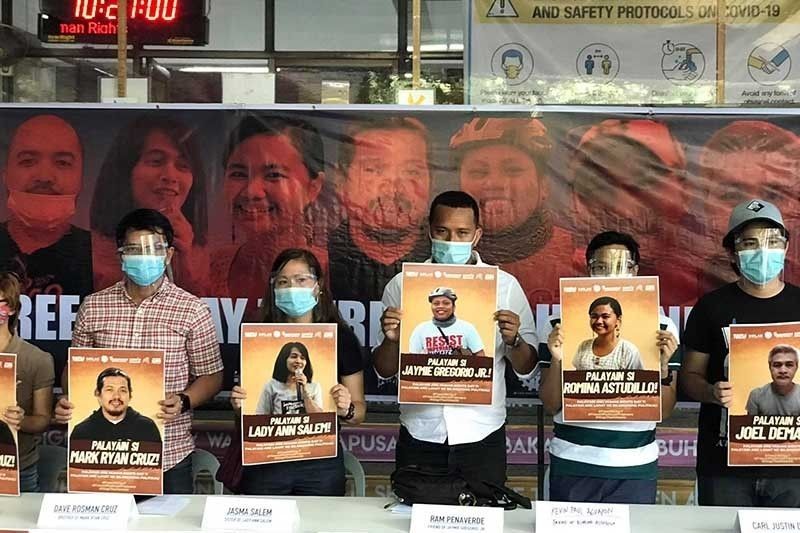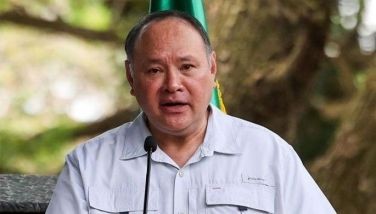Courts junk motion questioning warrant vs 4 activists nabbed on Human Rights Day

MANILA, Philippines — Two local courts junked separate motions questioning the issuance of search warrants that led to the arrest of four activists among the "Human Rights Day 7."
Quezon City Regional Trial Court Branch Branch 91 Presiding Judge Kathleen Rosario De la Cruz-Espinosa and Manila RTC Branch 50 Judge Bibiano Colasito junked the separate motions to quash search warrants issued by QC Judge Cecilyn Villavert-Burgos.
Espinosa ruled on the motion filed by trade unionists Mark Ryan Cruz, Romina Astudillo and Jaymie Gregorio, while Colasito handled the motion filed by trade unionist Joel Demate.
The Human Rights Day 7, including trade unionist Denisse Velasco, were arrested on December 10 in separate raids implementing the search warrant issued by Burgos, based on same applicants and witnesses presented.
Journalist Lady Ann Salem and trade unionist Rodrigo Esparago, also among the “Human Rights Day 7,” walked free in March after a Mandaluyong court granted a similar motion. Judge Monique Quisumbing-Ignacio held that Villavert issued a “general warrant” that was void for vagueness.
The Mandaluyong court also noted “substantial inconsistencies and contradictions” in the testimony and sworn statements of the informant and law enforcers involved in the operation.
READ: Arrests mar commemoration of International Human Rights Day
‘Search warrant issued based on probable cause’
Cruz, Astudillo and Gregorio went the same route as Salem and Esparago and moved for the quashal of the search warrant. The defense asserted that Villavert failed to make a probing and exhaustive examination of the applicant and witnesses, and instead propounded routinary questions that were a rehash of the affidavits.
But the Quezon City court noted that the Supreme Court in Oebanda v. People ruled that the judge bears the mandate to conduct a full and searching examination of the applicant and witnesses.
“Taking into consideration the foregoing principles, this court finds that the subject search warrant was issued based on probable cause, after a searching and probing personal examination under oath of applicant Police Capt. Michael Nathaniel Visco and his witnesses Kharl Lou Geronimo and [Patrolman] Ernie Ambuyoc,” the court said.
On the defense’s claim that the testimonies were inconsistent, the Manila court judge said she “finds that the collective testimonies of the witnesses would prompt a reasonably discreet person to believe that the offense of violation of RA 10951 was committed, and that the objects or items sought for could be found in the premises to be searched.”
“After a careful examination of the arguments of the accused, the court resolves to deny the omnibus motion,” the ruling read.
Cruz, Astudillo and Gregorio are set to be arraigned on May 4.
Deference to issuing court
Demate’s lawyers raised the same argument and said Villavert failed to make probing questions in the application.
The Manila court said that while, noticeably, the court that issued the search warrant failed to ask searching questions during the hearing on certain details such as the supposed gun-running syndicate, “still it appears that it conducted searching questions sufficient to evince a conclusion required for the issuance of the assailed search warrant.”
“[E]ven if the said court had shortcomings in its conduct of the inquiry, still this court has to defer to the former’s findings because as a rule, great respect must be accorded to it as it is presumed to have regularly performed its duties; and this court’s main task is only to check whether substantial evidence exists for the issuance of the warrant,” the ruling read.
The court also presumed the affidavits of the applicant and his witnesses as valid, as it noted that without evidence to prove that there was “reckless disregard for or that the affiants had prevaricated the truth,” it may not disturb conclusions reached by the issuing court on the matter.
Why is this important?
Activists are urging the Supreme Court to look into the “weaponization” of the law, citing the cases of arrests and killings in the implementation of court-issued search warrants that are usually against dissenters.
They called on the SC to place safeguards in its rules allowing Manila and Quezon City judges to issue search warrants that may be implemented across the country, as they note that these courts have issued “serial warrants,” based on one set of applicants and witnesses.
Responding to these concerns, the SC in March said they will issue rules on the use of body cameras during service of search and arrest warrants.
- Latest
- Trending
































